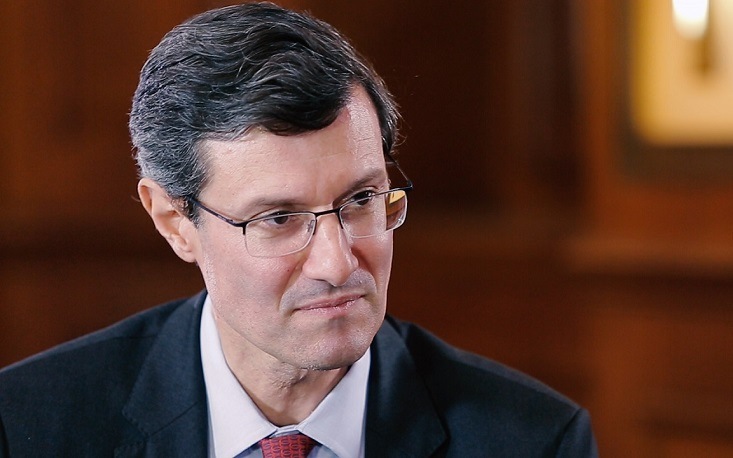RIO DE JANEIRO, BRAZIL – The coronavirus pandemic is compounding Brazil’s already complex economic scenario: after years of low growth, combined with political and social unrest, the country has also become a target of great distrust in the environmental area.

According to Alberto Ramos, head of Goldman Sachs’ Latin American economic research, there are a number of factors that keep investors away from Brazil. “There is a certain disillusionment,” Ramos said during a series of live interviews.
Excerpts from the interview are below:
What is Brazil’s image in the eyes of international investors today?
Brazil’s image has seen better days; there is a certain disillusionment. Brazil has been facing difficulties to show reasonable growth. The last time Brazil’s GDP grew by over two percent was in 2013. Nowadays, it is a country with a very low interest rate, making it unattractive for capital flows seeking a higher return.
There is a good and a bad reason why interest rates are this low: the good reason is that inflation is under control as is the monetary anchor; the bad reason is the poor labor market, which keeps prices low. There is persistent political turmoil, with friction between the different Branches. It started in the past, with Dilma Rousseff’s close reelection, and it is still there today. And finally, there’s the environmental issue, the focus of which has increased very recently. The investor’s perception is of little interest in the short term.
How much can the wrong environmental agenda affect the economy in practical terms?
It can get in the way, but it can also be an opportunity, attracting significant capital flows. The large institutional investors have environmental concerns. And Brazil, as the guardian of the Amazon, can hurt itself if it does not take the measures perceived as necessary. It is a domestic agenda, too. I would say that environmental risk is not a huge cost in the short term but in the future, it may be. It is an additional factor, in a very long list, that hinders Brazil.
The IMF has projected a nine percent drop in Brazil’s GDP in 2020. However, now banks have started to improve their projections. What is your perspective?
No doubt the most recent data has slightly exceeded expectations. But there was a violent drop in activity in March and April. Are the June and July data sustainable? A faster “v” shaped recovery is not the most likely. It’s not all that extraordinary, that after the end of social isolation, the economy generates much more positive figures. But we are a long way from the pre-Covid-19 activity level. This R$600 benefit program is producing a cash transfer of almost R$50 billion per month, which is practically one and a half times a Bolsa Família (Family Grant) per year. This helps cushion the drop.
How to reconcile a fiscal adjustment agenda with the need to regenerate the economy?
The economy will rebuild itself when the viral restriction is removed. This problem can only be solved with an effective treatment or a vaccine. It will be a very deep recession, but relatively short. Brazil already had a very serious fiscal problem. Brazil has had a primary deficit for six years. In order to stabilize its debt, we will have to achieve a surplus. With covid-19, the government had to spend much more. We are working with a primary fiscal deficit of between ten and 15 percent of GDP and public indebtedness of between 95 and 100 percent of GDP. And how to reconcile the pro-growth agenda with some fiscal measures? With the reforms. Everyone understands that the government had no choice but to make a fiscal expansion in the pandemic. But now is the time to redouble efforts for reforms, to provide medium and long term indications.
Yesterday the government submitted the tax reform text to Congress. How do you view that text at this time?
Everyone agrees that tax reform is necessary. First, because the tax burden is very heavy compared to emerging countries. And a tax simplification, even if in fact there were no extra revenues, would be very welcome. But we have shifted from the notion of tax reform that is neutral in terms of collection, to one that has some elements of increasing the tax burden, aimed at financing the increase in spending. Brazil is already taxing the population heavily, spending a lot, and investing little. Another important agenda is to increase the spending efficiency (of tax money), which today is very low.
Latin America is a region perceived as unattractive compared to other areas. What happened?
Latin America already had problems, particularly in terms of growth. The average growth for the past seven years was 0.8 percent per year. Per capita income was already declining. We saw social movements in Chile, Ecuador, and even Brazil a few years ago. In Argentina this is recurrent. The pandemic didn’t help, because it turned an ugly picture into an even more difficult one. Many countries made investments in terms of isolation – such as Argentina, Colombia, and Peru – and failed to effectively control the virus. They paid the cost of the drop in activity and impact on income levels with no public health benefit.
Source: O Estado de S. Paulo

